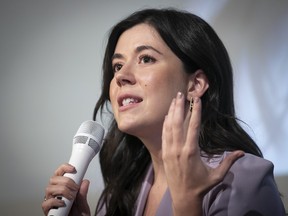Program was developed by Harvard and Bloomberg to help mayors become more effective and to learn from the successes of other cities.

Longueuil Mayor Catherine Fournier is just back from four days in New York, where she began a program in professional development in municipal management known as the Bloomberg Harvard City Leadership Initiative.
The program was developed to help mayors become more effective and to learn from the successes of other cities.
She met 38 counterparts from 11 countries on five continents and, at 32, Fournier was the youngest member of the current cohort, the eighth since the program started.
“I was by far the youngest one there,” she said. “Only three of us are in our 30s — the mayor of Nairobi, Kenya, who is 36, and the mayor of the German city of Fribourg, who is 39.”
Fournier is the first Quebecer to participate in the program, financed entirely by Bloomberg Philanthropies.
“I hope there will be others,” she said. “It’s a program which ought to be better known. I invite all my counterparts to apply for it. It gives me access to a such a rich network. It’s a privilege to have access to these resources and to this training,” she said in an interview.
A communication about the program from the Federation of Canadian Municipalities several months back piqued her curiosity and interested her immediately.
“That’s what made me apply. I knew in April or May that I had been selected. What is interesting is that the entire city benefits because we are able to name two other people within our administration who can participate in this yearlong program.”
Fournier chose her chief of staff, Louis-Philip Prévost, and Longueuil city director Alexandre Parizeau. They will start the program next month.
“More broadly, the entire municipal administration can have access to the resources of Harvard University. There is even a team that comes here to answer our questions and provide personalized support. It’s really a whole range of offers of support for us,” she said.
Fournier began the program informally on June 25 with a virtual session. The official launch was last week with four days in person in New York.
“It was really intensive,” she said. “We were in a class in the Bloomberg offices that replicated a Harvard classroom model. We started early in the morning, at about 8:30, and finished at about 5:30. We had training and courses given as seminars with professors from several faculties at Harvard, such as the Kennedy School (of public policy and government), the business school and the design faculty. It was quite varied.”
Over the coming year, there will potentially be other in-person meetings, but the program will be mainly virtual.
Before starting, candidates are advised they must be fully involved and spend at least two hours each week with the program, Fournier said.
“They told us from the start their goal is really not to tell us how to do our work,” Fournier said. “Their goal is to support us so we have the tools to be even more effective and, by extension, to benefit the community. It’s a commitment. It takes time. There is a lot of reading.”
One of the first steps was to identify a priority issue on which to work. Half the participants chose housing and homelessness, and a good number chose climate resiliency. Fournier opted for the housing crisis: “No surprise there,” she said.
“We are invited to do case studies and to trace parallels with our problem to try to think outside the box and to find new solutions,” she said. “We are taught to step away from inaction and that oft-used phrase: ‘We never did things this way.’ It’s that kind of questioning that is put forward. That’s the point of the exercise.”
Fournier said she was extremely stimulated by this first experience.
“I came away from the four intensive days already feeling very optimistic. To be able to exchange ideas stimulates one’s creativity. You see how certain issues could apply in our community.
“To have this outside perspective is super relevant. Often, when you are at the head of a municipal administration, no one gives you critical opinions. There are the voters, to be sure, but not from day to day. It helps to have such resources.”
Since its inception in 2017, the Bloomberg Harvard City Leadership Initiative has involved 314 mayors from 33 countries on six continents.